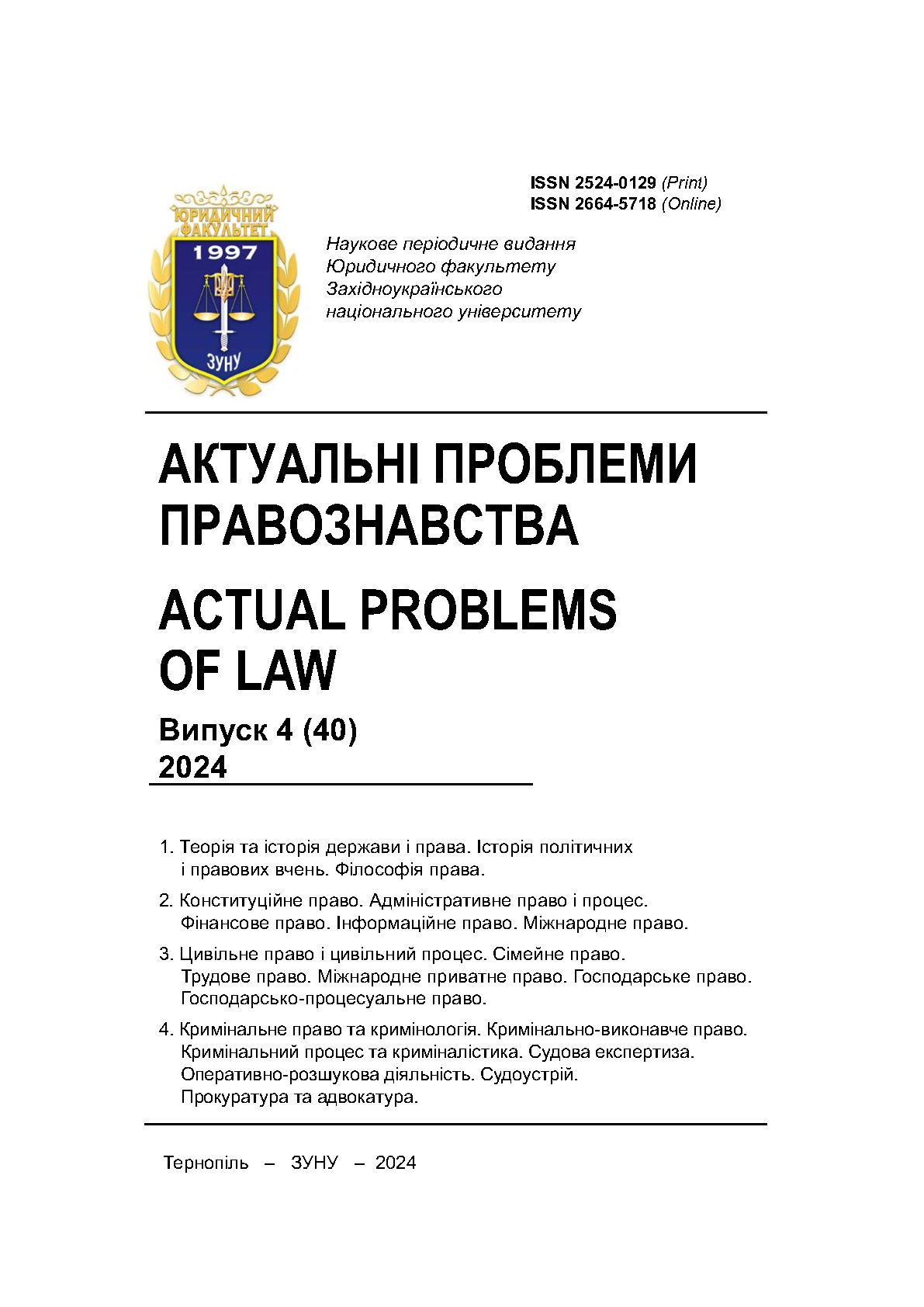The role of law enforcement authorities in regulating relations concerning the collection of taxes and fees in the context of European integration
DOI:
https://doi.org/10.35774/app2024.04.037Keywords:
European countries, European integration, EU member states, law enforcement agencies, collection of taxes and fees, law enforcement function, taxation, state budget, financial offenses, taxes, fees, tax system, administrative and legal support, tax policyAbstract
The article examines the role of law enforcement agencies of Ukraine, their interaction with the State Tax Service of Ukraine in the field of taxation in the context of European integration. An important component of this process is the adaptation of legislation and the transformation of key state institutions, in particular in tax policy.
The process of adapting Ukrainian legislation to standards requires significant changes in the field of taxation, where law enforcement agencies play a key European role in combating economic crimes such as tax evasion and corruption.
The tax system is the main tool for ensuring the economic stability of the state, and its effective functioning depends on the interaction of law enforcement agencies, which provide the role of control and supervision over compliance with tax legislation.
In this context, special attention is paid to the fight against tax evasion, corruption and financial crimes, which is an important requirement for achieving compliance with European Union standards.
The study also identifies the main areas of activity of law enforcement agencies, including: detection and prevention of tax offenses, investigation of financial crimes, prevention of corruption and protection of the rights of honest taxpayers.
The problems of administrative and legal regulation of this activity are also analyzed and ways of optimizing the mechanisms of interaction of state authorities are proposed to increase the efficiency of law enforcement functions in the field of taxation. At the same time, in the context of integration, the importance of implementing international standards, such as BEPS and automatic exchange of European tax information, as well as the use of modern digital technologies is emphasized.
It was emphasized that all efforts to adapt to international standards in the field of tax policy must comply with the key principles of legality, transparency and fairness, which are the basis of European legal culture. Only by adhering to these principles can one succeed in creating a stable and effective tax system that will contribute to economic development and increase citizens' trust in the state.
Downloads
References
1. Baranov, S. O. (2023). Vzaiemodiia derzhavnoi podatkovoi sluzhby Ukrainy z pravookhoronnymy orhanamy ta orhanamy publichnoi administratsii: teoretychni ta praktychni aspekty [Interaction of the State Tax Service of Ukraine with law enforcement agencies and public administration bodies: theoretical and practical aspects]. Pravo ta derzhavne upravlinnia - Law and state management, 3, 251-259 [in Ukrainian] https://doi.org/10.32782/pdu.2023.3.38
2. Arkusha, L. I. (2003). Problemy vzaiemodii ta informatsiinoho zabezpechennia pravookhoronnykh orhaniv u borotbi z ekonomichnoiu orhanizovanoiu zlochynnoiu diialnistiu [Problems of interaction and information support of law enforcement agencies in the fight against economic organized crime. Informatsiine zabezpechennia protydii orhanizovanii zlochynnosti: zb. nauk. Statei. Biblioteka zhurnalu «Iurydychnyi visnyk» - Information support for combating organized crime: coll. of science Articles. Library of the magazine «Legal Bulletin», 109-117 [in Ukrainian]
3. Dmytrenko, S. O. (2019). Administratyvno-pravove zabezpechennia realizatsii pravookhoronnoi funktsii u sferi opodatkuvannia: dosvid yevropeiskoho soiuzu ta perspektyvy yoho adaptatsii v Ukraini [Administrative and legal support for the implementation of law enforcement functions in the field of taxation: the experience of the European Union and the prospects for its adaptation in Ukraine]. Naukovi zapysky. Seriia: Pravo - Proceedings. Series: Law, (6), Spetsvypusk, Tom 2. Retrieved from https://salo.li/FEA376f [in Ukrainian]
4. Podik, I. I., Zhyvko, M. O. & Volnykh, A. I. (2018). Elektronnyi audyt na osnovi podatkovoho audytorskoho failu: svitovyi dosvid ta ukrainski perspektyvy. [Electronic audit based on the tax audit file: global experience and Ukrainian prospects]. Sotsialno-pravovi studii - Social and Legal Studies, 1, 158-166 [in Ukrainian]
5. E-audyt, standartnyi audytorskyi fail SAF-T UA ta oblikova polityka. (2021). [E-audit, SAF-T UA standard audit file and accounting policy]. KPMG. Retrieved from https://kpmg.com/ua/uk/home/insights/2021/08/e-audyt-oblikova-polityka.html [in Ukrainian]
6. Zakhody shchodo «Planu BEPS» u sviti ta v Ukraini. [Measures regarding the "BEPS Plan" in the world and in Ukraine]. Retrieved from https://itaccounting.com.ua/zahodi-shhodo-planu-beps-u-sviti-ta-v-ukrayini [in Ukrainian]
7. Rybachenko, S. P. (2022). Vzaiemodiia Derzhprykordonsluzhby z inshymy pravookhoronnymy orhanamy yak skladova zakhystu derzhavnoho kordonu: teoretychnyi aspekt [Interaction of the State Border Service with other law enforcement agencies as a component of state border protection: theoretical aspect]. Suchasne suspilstvo: kol. monohr. 328-337 [in Ukrainian]
Downloads
Published
Issue
Section
License

This work is licensed under a Creative Commons Attribution-NonCommercial 4.0 International License.





